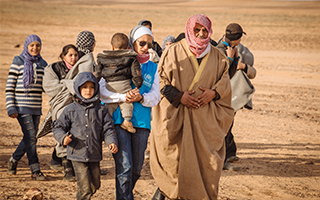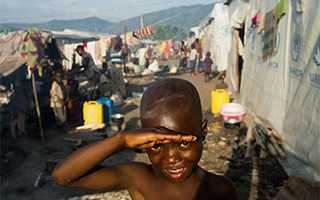UNHCR in Canada
The United Nations High Commissioner for Refugees (UNHCR) was created in 1950 by the UN General Assembly. It is mandated to lead and coordinate international action to protect and assist refugees and find a solution to their plight worldwide. Asylum-seekers, returnees, internally displaced persons and stateless persons are also under UNHCR’s mandate. UNHCR Headquarters are in Geneva, Switzerland. The Agency has operations in more tan 125 countries. In 1976, UNHCR opened its doors in Canada.
Protection
Durable Solutions
Work with the Canadian government, private sponsors and businesses to help coordinate resettlement opportunities in Canada, including through additional pathways like refugee scholarships.
Communications
Inform and educate Canadians about the situation of refugees and other displaced persons around the world, as well as the work of UNHCR, in order to strengthen support for those most vulnerable.
Fundraising
Protection
Canada is party to the 1951 Refugee Convention that sets out the obligations of States towards refugees and asylum-seekers. Stateless persons also fall within UNHCR’s mandate. Refugees shall not be returned to a country where they would be at risk of persecution.
The main activities of UNHCR’s protection work in Canada include:
- Strengthening Canada’s asylum system by ensuring that it protects asylum-seekers and guarantees their fair access to the refugee status determination process
- Ending the detention of asylum-seekers by providing alternatives to detention
- Supporting the government to strengthen its capacity to collect and analyze data regarding asylum-seekers, refugees — including resettled ones — and stateless persons
- Advocating on key protection issues to help improve government’s and civil society’s policies and services for refugees
Durable Solutions
Resettlement is one of the three durable solutions that UNHCR promotes for refugees. The other two are (a) voluntary repatriation to the country of origin of refugees when conditions (security, access to basic services like health and education) permit a safe and dignified return, and (b) local integration in the first country of asylum.
Resettlement is used in specific instances to provide protection for refugees who cannot remain in the country where they first found asylum because they:
- Are in physical danger possibly because of their background such as their ethnicity, personal profile linked to past activities, or sexual orientation
- Are in need of specialized services because they are survivors of torture or sexual violence, or in need of medical treatment not available in the country where they found asylum
Every year, UNHCR refers thousands of refugees in need of resettlement to a number of countries, including Canadam which is one of the largest resettlement receiving countries.
UNHCR also advocates in Canada for additional pathways through private sponsorship, the granting of scholarships for refugees, and the engagement of private businesses.
Communications
Public information and educational materials are made available by UNHCR to help keep Canadians informed and to build support for refugees, asylum-seekers, internally displaced, and stateless persons in Canada and abroad.
Through various media channels and public events, UNHCR seeks the support of the Canadian public and government to bolster its advocacy work in Canada and its operations throughout the world.
Fundraising
UNHCR is funded almost entirely by voluntary contributions, principally from governments, but also from corporations, foundations and individuals.
UNHCR actively raises funds in Canada and engages the public in the plight of refugees and displaced people. UNHCR Canada is a Qualified Donee, as defined by the Canada Revenue Agency (CRA), which allows us to issue tax receipts when you make a cash donation.



